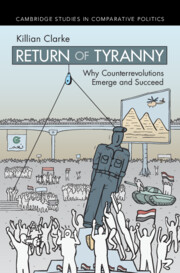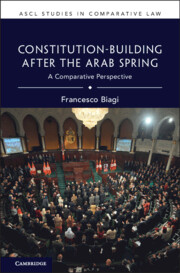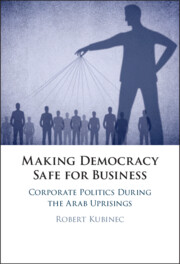Refine search
Actions for selected content:
101 results
Portrait of a Martyr as a Young Man: Social Lives of Photographs in Revolutionary Egypt
-
- Journal:
- Comparative Studies in Society and History , First View
- Published online by Cambridge University Press:
- 24 October 2025, pp. 1-34
-
- Article
-
- You have access
- Open access
- HTML
- Export citation
8 - Conclusion
-
- Book:
- Return of Tyranny
- Published online:
- 17 September 2025
- Print publication:
- 23 October 2025, pp 234-248
-
- Chapter
- Export citation
6 - A Popular Mobilization and Egypt’s Counterrevolution
-
- Book:
- Return of Tyranny
- Published online:
- 17 September 2025
- Print publication:
- 23 October 2025, pp 170-202
-
- Chapter
- Export citation
5 - Political Elites and Egypt’s Counterrevolution
-
- Book:
- Return of Tyranny
- Published online:
- 17 September 2025
- Print publication:
- 23 October 2025, pp 118-169
-
- Chapter
- Export citation
1 - Introduction
-
- Book:
- Return of Tyranny
- Published online:
- 17 September 2025
- Print publication:
- 23 October 2025, pp 1-17
-
- Chapter
-
- You have access
- HTML
- Export citation

Return of Tyranny
- Why Counterrevolutions Emerge and Succeed
-
- Published online:
- 17 September 2025
- Print publication:
- 23 October 2025
29 - Revolution
- from Part II - Modalities
-
-
- Book:
- The Cambridge Handbook of Constitutional Theory
- Published online:
- 27 March 2025
- Print publication:
- 24 April 2025, pp 491-520
-
- Chapter
- Export citation
Chapter 5 - Social Movements and Singularities
- from Part II - Sudden Unexpected Changes
-
- Book:
- The Meaning of Paradoxes and Paradoxical Thinking
- Published online:
- 04 April 2025
- Print publication:
- 13 March 2025, pp 42-51
-
- Chapter
- Export citation
6 - Conclusion
-
- Book:
- The Last Caravan
- Published online:
- 09 January 2025
- Print publication:
- 23 January 2025, pp 259-263
-
- Chapter
- Export citation

Constitution-Building After the Arab Spring
- A Comparative Perspective
-
- Published online:
- 31 December 2024
- Print publication:
- 09 January 2025
8 - The Royal Advantage in Power Sharing and Blame Shifting
-
- Book:
- The King Can Do No Wrong
- Published online:
- 21 November 2024
- Print publication:
- 28 November 2024, pp 236-276
-
- Chapter
- Export citation
Chapter 4 - Violent Worlds
-
- Book:
- Insurgent Cultures
- Published online:
- 07 December 2024
- Print publication:
- 28 November 2024, pp 182-224
-
- Chapter
-
- You have access
- Open access
- HTML
- Export citation
6 - Aging Out?
- from Part III - Political
-
- Book:
- Encounters with Islam
- Published online:
- 09 September 2023
- Print publication:
- 14 September 2023, pp 106-131
-
- Chapter
- Export citation
7 - Threatening Citizens with Repression
-
- Book:
- Propaganda in Autocracies
- Published online:
- 18 July 2023
- Print publication:
- 14 September 2023, pp 289-334
-
- Chapter
- Export citation
8 - Western Hybrid Warfare: Crisis and Subversion in Regime Change
-
-
- Book:
- Rethinking Warfare in the 21st Century
- Published online:
- 29 June 2023
- Print publication:
- 13 July 2023, pp 219-245
-
- Chapter
- Export citation
Introduction
-
- Book:
- Making Democracy Safe for Busines
- Published online:
- 22 June 2023
- Print publication:
- 06 July 2023, pp 1-7
-
- Chapter
- Export citation

Making Democracy Safe for Busines
- Corporate Politics During the Arab Uprisings
-
- Published online:
- 22 June 2023
- Print publication:
- 06 July 2023
9 - Conclusion
- from Part IV - Conclusion
-
- Book:
- Conquests and Rents
- Published online:
- 01 June 2023
- Print publication:
- 15 June 2023, pp 263-274
-
- Chapter
- Export citation
8 - The Palestinian Minority in Israel
-
-
- Book:
- Family Law and Gender in the Middle East and North Africa
- Published online:
- 18 May 2023
- Print publication:
- 01 June 2023, pp 149-163
-
- Chapter
- Export citation
6 - The Status of Muslim Women in the Mosaic of Islamic Family Law in Lebanon
-
-
- Book:
- Family Law and Gender in the Middle East and North Africa
- Published online:
- 18 May 2023
- Print publication:
- 01 June 2023, pp 113-126
-
- Chapter
- Export citation
